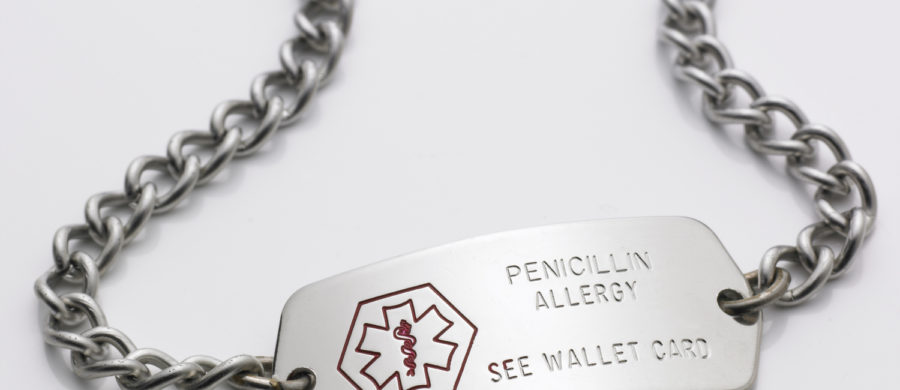Did you know that the vast majority of individuals who think they have a penicillin allergy actually don’t? It’s true! Penicillin is the most commonly reported drug allergy in the United States, but 9 out of 10 patients who report a penicillin allergy aren’t truly allergic.¹
Why is identifying those who are not actually allergic to penicillin so important?
When a patient carries a penicillin allergy label, their healthcare can be impacted in several ways:
- Inaccurate diagnosis of penicillin allergy can adversely impact medical costs for both patients and healthcare systems: research shows that antibiotic costs for patients reporting penicillin allergies are up to 63% higher than for those who do not report being penicillin-allergic.3
- Patients labeled penicillin-allergic may have a threefold increased risk of adverse events (ADE).4 In the hospital setting, history of penicillin allergy translates to about 10% more hospital days,3 30% higher incidence of VRE infections, 23% higher incidence of C difficile infections, and 14% higher incidence of MRSA infections.5
- Correctly identifying those who are not actually allergic can improve antibiotic prescribing and combat the risk of super-bugs by allowing patients access to safer, less toxic antibiotics.4 By some estimates, up to half of all hospitalized patients in the US receive antibiotics, and up to half of the antimicrobial use may be inappropriate.6 There is a causal relationship between inappropriate antimicrobial use and resistance; changes in antimicrobial use lead to parallel changes in resistance prevalence.1
How are penicillin allergies misdiagnosed?
Several factors can lead to misdiagnosis. For instance, some side effects of penicillin and symptoms of illnesses can be similar. Perhaps you were sick in the past, received penicillin, and experienced a skin rash. These symptoms could have been related to a viral or bacterial infection on its own or resulted from a true penicillin allergy. If you were not specifically tested, you might have been misdiagnosed as allergic.
Also, even if you were allergic to penicillin at one time in your life, you may no longer be. According to the CDC, approximately 80 percent of patients with a penicillin allergy lose their sensitivity after 10 years.
How can I find out if I’m allergic to penicillin?
Today, we have skin test methods to help identify patients who may be truly penicillin-allergic and those who are not. Pending your clinical history, testing for a penicillin allergy with skin scratch tests followed by a test placed just under the skin may be recommended. If you test negative, and observed oral ingestion of the medication is performed to ensure that you will not have an immediate reaction the next time you require the medication. The first ingestion is performed under supervision with a team experienced in treating allergic reactions in the unlikely event there would be a severe reaction to the medication.
References
- Macy, Eric. Penicillin Allergy: Optimizing Diagnostic Protocols, Public Health Implications, and Future Research Needs. Current Opinion in Allergy and Clinical Immunology: August 2015 – Volume 15 – Issue 4 – p 308–313
- Is it really a penicillin allergy? Centers for Disease Control and Prevention website. https://www.cdc.gov/antibiotic-use/community/for-hcp/Penicillin-Allergy.html. Updated, October 31, 2017. Accessed September 4, 2019.
- Macy, E., & Contreras, R. (2014). Healthcare Use and Serious Infection Prevalence Associated with Penicillin “Allergy” in Hospitalized Patients: A Cohort Study. Journal of Allergy and Clinical Immunology, 133(3), 790-796.
- Owens, R. C., Fraser, G. L., & Stogsdill, P. (2004). Antimicrobial Stewardship Programs as a Means to Optimize Antimicrobial Use. Pharmacotherapy, 24(7), 896-908.
- Blumenthal, Kimberly G., et al. “Addressing Inpatient Beta-Lactam Allergies: A Multihospital Implementation.” The Journal of Allergy and Clinical Immunology: In Practice 5.3 (2017): 616-625.
- Dellit, T. H. (2007). Summary of the Infectious Diseases Society of America and the Society for Healthcare Epidemiology of America Guidelines for Developing an Institutional Program to Enhance Antimicrobial Stewardship. Infectious Diseases in Clinical Practice, 15(4), 263-264.
 About Katie McCormack, MD
About Katie McCormack, MD
Allergy, Asthma and Immunology Specialist at Boulder Medical Center
As part of the Allergy Department at Boulder Medical Center, Dr. Katie McCormack treats infant, youth, and adult patients for everything from seasonal and food allergies to asthma and eczema. She strives to educate, inform, and empower her patients to become participants in their own wellness and care.
Dr. McCormack welcomes new patients in her Louisville, Colo. clinic. She regularly sees patients from throughout Boulder County and those from nearby communities, including Broomfield, Westminster, Arvada, Golden.
Learn More
- Dr. McCormack’s Full Profile
- Please call for an appointment: (303) 440-3083

